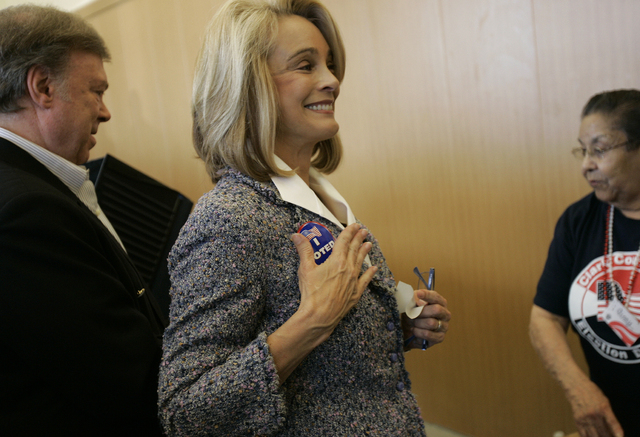Lowden may walk away from some campaign debt
Republican Lt. Gov. candidate Sue Lowden may walk away from some of the hundreds of thousands of dollars in debt from her failed U.S. Senate campaign in 2010, her campaign treasurer said Monday.
Lowden has settled less than half of $537,970.46 in unpaid campaign bills and is working on getting the remaining debt either forgiven and or negotiated down to smaller amounts for repayment, if possible, said Bob Beers, a Las Vegas city councilman, who is Lowden’s treasurer.
The third option is to “go out of business without paying,” Beers said of Lowden’s campaign committee. “The goal is to pay all of the debt, but for a losing federal campaign, it’s not uncommon to have unpaid debt.”
Beers said many of the outstanding bills are in dispute or came in after the campaign ended in what he called “the dog pile effect.” At the end of 2010, Lowden listed more than $250,000 in unpaid debt — which then doubled as bills came in after the election, including some that were disputed.
Lowden, a casino operator who is independently wealthy, loaned her campaign $1.9 million and forgave that debt, according to papers filed with the Federal Elections Commission.
On Friday, the FEC sent Beers a letter giving the Senate campaign until Dec. 20 to respond with a new debt settlement plan. The FEC rejected two previous plans. The FEC threatened “enforcement action,” which could result in a fine. Lowden’s Senate campaign is still carrying some $331,764.02 in bills to about 10 vendors.
“Any response submitted by your committee will be placed on the public record and will be considered by the Commission prior to taking enforcement action,” the FEC said.
It’s not that unusual for losing campaigns to rack up debt and then not pay all the bills, according to Craig Holman, a campaign finance expert with the watchdog group Public Citizen. But he said it’s troubling when candidates don’t pay their bills, thus increasing the chances of ethical lapses as candidates seek contributions from all quarters.
Holman said it also might make it difficult for Lowden to hire vendors or attract contributions for her lieutenant governor campaign. Her second fundraiser is scheduled for tonight.
“Vendors everywhere ought to take note,” Holman said. “That ought to be a huge hamper on her next campaign. Candidates really should be required to retire their debt before they run for political office.”
Beers said there aren’t any problems, and he doesn’t expect the debt issue to haunt Lowden.
“I don’t think it will be a campaign issue,” said Beers. “I don’t think most citizens find this an important part of their decision.”
Lowden referred financial questions to Beers.
Lowden, who lost to Sharron Angle in a GOP primary to take on U.S. Sen. Harry Reid, D-Nev., stacked up more unpaid bills than any other House or Senate candidate in the past three election cycles, 2007-2012, according to FEC records.
The top six reported campaign debts came from Lowden ($537,970); former Rep. Laura Richardson, D-Calif., ($514,895); Rep. Michael Grimm, R-NY ( $420,724); failed Senate candidate Jane Bergman Norton, R-Colo., ($313,107); failed Senate candidate Wendy Long, R-NY, ($282,547); and Sen. Dean Heller, R-Nev., ($213,717).
Heller spokesman Chandler Smith said the senator has paid off most of the debt already.
“He plans to have it completely paid very soon,” Smith said.
Heller’s opponent, former Rep. Shelley Berkley, D-Nev., posted a debt repayment plan in April. In her July campaign committee termination report, she still owed $5,101.30 in legal fees.
Berkley said Tuesday her campaign had now paid off its remaining debt.
Peter Urban in the Stephens Washington Bureau contributed to this report. Contact reporter Laura Myers at lmyers@reviewjournal.com or 702-387-2919. Follow her on Twitter @lmyerslvrj.


















